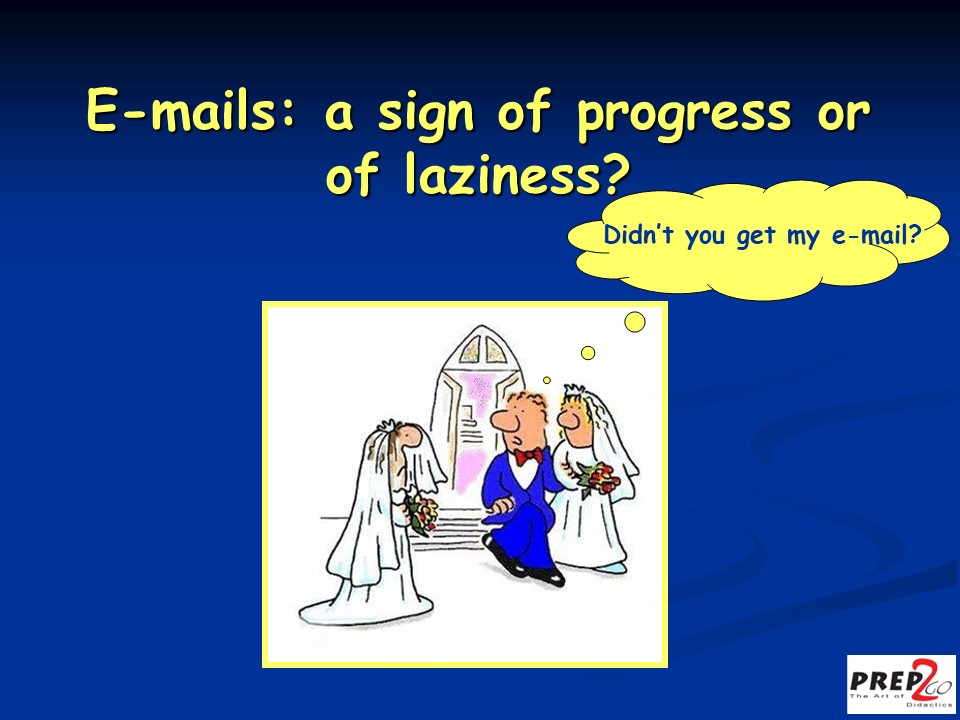l8r1 - PowerPoint PPT Presentation
Title:
l8r1
Description:
df – PowerPoint PPT presentation
Number of Views:1
Title: l8r1
1
E-mails a sign of progress or of laziness?
Didnt you get my e-mail?
2
Ten years ago, e-mails were considered a very
sophisticated method of communication. Nowadays,
however, e-mail messaging has become a normal way
of communicating, not only between working people
but also between people at home. Text messaging
and chatting via a mobile phone are still the
most frequent methods of communication among
teenagers, but e-mails are fast becoming more
and more common in this age group. This
little flying yellow envelope on the screen
changed the world of communication. Words like
stamps, post office or postman no longer
belong to a teenagers vocabulary. New words are
born e-mail, sent items, received items,
recipient, attachment and symbols, too. These
words have replaced the old ones. Your pen
friend, or should we say key pal, is only a click
away. Nevertheless, not everyone approves of the
spread of e-mails. Teachers are in two minds. On
the one hand, it is good that students spend a
lot more of their free time exchanging
e-mails and as a result get more practice at
writing.
When you click the underlined words youll see
the Turkish meaning of them.
3
On the other hand, there is very little attention
to correct spelling, punctuation and grammar.
What is more, e-mails tend to be very sloppy.
Many older people, who are more used to formal
business letters, also feel that the style of
writing is too informal. For instance, it is
quite common to use first names even though one
has never met the person he is addressing. I
would say that e-mails are a good invention
although they will probably never replace either
telephone calls or ordinary letters. As far as I
am concerned, they are just another, very
efficient, means of communication.
4
Text Messaging -) or -( ?
Some text-message abbreviations.
5
The latest trend among British teenagers is
text-messaging sending short e-mails by phone to
their friends. 96 of British students under 16
who have a mobile phone use their phones to send
text messages. Texting is great for teenagers
who have pay-as-you-go phones because its
cheaper and more private than making calls.
The craze has also produced its own language ?
GR8 2CU (Great to see you) ? RUOK (Are you
Okay?) ? THX (Thanks) ? -( (No) and ( (Im
sad) Nosy parents or teachers cant understand
it. For most adults this language is a code that
only teenagers can handle. Text messaging is
cheaper so I use it a lot more than phoning,
says Rachel. The coolest thing is that my
parents cant read my messages. Isnt that XLNT
and GR8? -)?
6
- QUESTIONS A
- What are the advantages and disadvantages of
e-mail messaging and texting? - 2. Which age group tends to text the most? Why?
- 3. Can texting and e-mailing replace phone calls
or ordinary letters? - 4. Do people use formal or informal language in
their short text messages? - 5. What is a pay-as-you-go phone?
- 6. Name some of the symbols which people use when
they text each other. Do you use/know any other
abbreviations?
7
- QUESTIONS B
- Say whether these statements are True or False.
Correct the false ones using your own words. - E-mail writing became a very popular method of
communication as soon as it was introduced. - 2. Teenagers no longer use words connected with
traditional mailing. - 3. The increasing use of e-mail writing is a
controversial issue. - 4. One of the advantages of e-mail writing
according to teachers is that students improve
their spelling, punctuation, and grammar.
?
?
?
X
8
5. Addressing a person we have never met before
by his/her first name shows the degree of
informality used in e-mail writing. 6. 96 of
British teens under 18 use their phones for
texting. 7. stamps, post office, pigeon
post, and skateboard no longer belong to a
teenagers dictionary. 8. Teenagers like texting
because it is a cheaper and more private way to
communicate with their friends.
X
X
X
?
9
to be considered ? nitelendirilmek
10
sophisticated ? karmasik
11
nowadays ? günümüzde
12
via ? araciligi ile
13
among ? arasinda
14
common ? bilinen
15
to belong to ? ait olmak
16
sent items ? gönderilmis ögeler
17
received items ? alinmis ögeler
18
recipient ? alici
19
attachment ? eklenti
20
key pal ? internet arkadasi
21
nevertheless ? ama yine de
22
to approve ? dogru bulmak
23
spread ? yayilis
24
to be in two minds ? bocalamak
25
attention ? dikkat
26
punctuation ? noktalama
27
what is more ? dahasi
28
to tend to ? egilimde olmak
29
sloppy ? bastan savma
30
for instance ? örnegin
31
invention ? bulus
32
efficient ? elverisli
33
craze ? moda
34
to produce ? yaratmak
35
nosy ? merakli
36
to handle ? üstesinden gelmek































